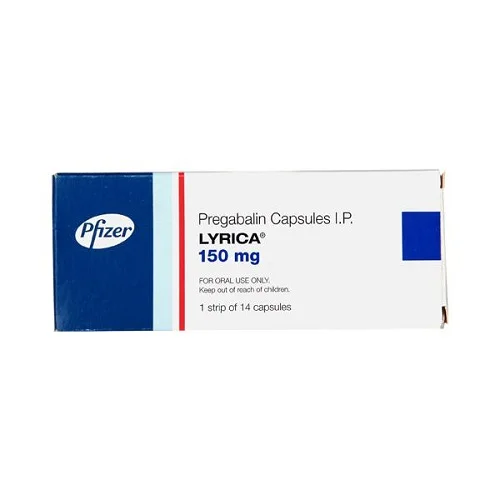
Nerve pain, or neuropathic pain, can be a debilitating condition, often resulting from injuries, infections, or diseases that affect the nervous system. Among the medications used to manage this type of pain, Lyrica 150 mg (pregabalin) has gained recognition for its effectiveness. This article explores the uses, benefits, and considerations associated with Lyrica, providing a comprehensive overview for those considering this treatment option.
What is Lyrica?
Lyrica, the brand name for pregabalin, is a prescription medication primarily used to treat nerve pain, fibromyalgia, and seizures. It is classified as an anticonvulsant and works by affecting certain neurotransmitters in the brain, thereby reducing the transmission of pain signals.
How Does Lyrica Work?
Lyrica is thought to bind to calcium channels in the nervous system, which in turn decreases the release of excitatory neurotransmitters. By inhibiting the overactivity of nerve signals, Lyrica helps to alleviate pain and improve the quality of life for those suffering from neuropathic pain.
Uses of Lyrica 150 mg
-
Neuropathic Pain Management
One of the primary indications for pregabalin 150 mg capsule is the treatment of neuropathic pain, which can arise from conditions such as diabetes (diabetic neuropathy), shingles (postherpetic neuralgia), or spinal cord injuries. Patients often report significant relief from pain, burning, and tingling sensations.
-
Fibromyalgia
Lyrica is also approved for the management of fibromyalgia, a chronic condition characterized by widespread musculoskeletal pain, fatigue, and sleep disturbances. Studies have shown that Lyrica can help reduce pain and improve overall functioning in individuals with fibromyalgia.
-
Seizure Disorders
In addition to its use for nerve pain, Lyrica is prescribed as an adjunctive therapy for partial seizures in adults. This helps those with epilepsy manage their condition more effectively.
Benefits of Lyrica 150 mg
-
Effective Pain Relief
One of the most significant benefits of 150 mg of lyrica is its effectiveness in managing nerve pain. Many patients report a notable decrease in pain levels, allowing them to engage more fully in daily activities and improve their overall quality of life.
-
Quick Onset of Action
Lyrica typically begins to exert its effects within a week or two of starting treatment, which is relatively quick compared to other pain management options. This fast-acting nature can be particularly beneficial for patients seeking immediate relief.
-
Tolerability
Many patients tolerate Lyrica well, experiencing fewer gastrointestinal side effects compared to traditional pain medications like non-steroidal anti-inflammatory drugs (NSAIDs) or opioids. This can make Lyrica a preferable option for long-term management of chronic pain.
-
Versatile Use
Lyrica’s versatility in treating various conditions—from neuropathic pain to fibromyalgia—means that it can serve multiple purposes for patients suffering from chronic pain conditions.
Dosage and Administration
Starting Dose
The typical starting dose of Lyrica 150mg is 150 mg per day, divided into two or three doses. Depending on individual response and tolerability, healthcare providers may adjust the dose.
Gradual Titration
It’s important to titrate the dosage gradually. Increasing the dose too quickly may increase the risk of side effects. Patients should work closely with their healthcare providers to find the optimal dose for their needs.
Consistency
For maximum effectiveness, Lyrica should be taken consistently, either with or without food. Patients are encouraged to take their doses at the same times each day to maintain steady levels of the medication in their system.
Potential Side Effects
While Lyrica 150 mg is generally well-tolerated, some individuals may experience side effects. Common side effects include:
Dizziness: Many users report feeling lightheaded, especially when starting the medication or increasing the dose.
Drowsiness: Lyrica can cause sedation, which may impact daily activities such as driving or operating machinery.
Weight Gain: Some patients may notice an increase in appetite and subsequent weight gain, which should be monitored.
Swelling: Peripheral edema, or swelling in the legs and feet, can occur and may require medical attention if severe.
Less common but serious side effects include allergic reactions, mood changes, and suicidal thoughts. Patients should seek immediate medical help if they experience any severe reactions.
Precautions and Considerations
-
Medical History
Before starting Lyrica 150, patients should inform their healthcare providers about their complete medical history, particularly any history of substance abuse, depression, or kidney problems. Pregabalin is primarily eliminated through the kidneys, and dosage adjustments may be necessary for individuals with renal impairment.
-
Drug Interactions
Lyrica can interact with other medications, including opioid pain medications and certain antidepressants, potentially increasing the risk of sedation and respiratory depression. It’s crucial for patients to disclose all medications and supplements they are taking to avoid harmful interactions.
-
Withdrawal Symptoms
Suddenly stopping Lyrica can lead to withdrawal symptoms, including increased pain, anxiety, and insomnia. Therefore, it’s essential to follow a healthcare provider’s guidance when discontinuing the medication, often involving a gradual tapering off.
-
Pregnancy and Breastfeeding
Pregnant or breastfeeding women should discuss the risks and benefits of using Lyrica with their healthcare provider. While it is classified as a pregnancy category C drug (meaning risks cannot be ruled out), the potential effects on the fetus must be carefully weighed against the need for treatment.
Conclusion
Lyrica 150 mg is a valuable option for managing nerve pain, offering benefits such as effective pain relief, quick onset of action, and a favorable tolerability profile. However, like any medication, it is essential to use it under the supervision of a healthcare provider to ensure safe and effective treatment.
Patients considering Lyrica for nerve pain should have an open dialogue with their healthcare providers about their symptoms, treatment goals, and any concerns they may have. With the right approach, Lyrica can significantly improve quality of life for those struggling with neuropathic pain and related conditions. Always remember that effective pain management is a crucial component of overall health and well-being.




